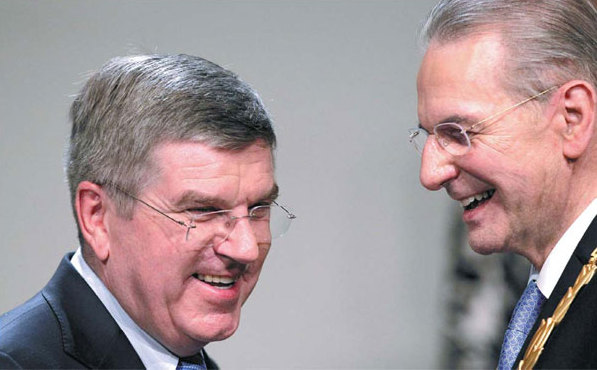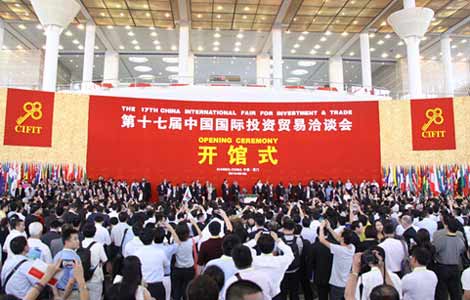No honeymoon period for Bach
Updated: 2013-09-12 07:55
By Associated Press in Buenos Aires (China Daily)
|
||||||||
|
Outgoing International Olympic Committee president Jacques Rogge (right) stands with Thomas Bach of Germany after he was elected the ninth president of the IOC in a vote at the organization's congress in Buenos Aires on Tuesday. Enrique Marcarian/Reuters |
New IOC boss inherits Games headaches in Sochi and Rio
International Olympic Committee president-elect Thomas Bach will be tested quickly by the Winter Games less than five months away in the southern Russian resort of Sochi, and the Summer Olympics in Rio de Janeiro - still three years away but setting off alarms.
Bach was elected to the top job on Tuesday, replacing Jacques Rogge as head of the IOC.
One of the first phone calls he received was from Russian President Vladimir Putin, who is staking some of his prestige on the Sochi Games.
"He congratulated me and (said) there would be close cooperation to make (sure of) the success of the Sochi Games," Bach said.
The buildup to the Feb 7-23 Games has been overshadowed by concerns with cost overruns, a budget topping $50 billion, security threats and a Western backlash against a Russian law against "gay propaganda".
Bach and the IOC has been told by the Russians there would be no discrimination against anyone in Sochi, and that Russia would abide by the Olympic Charter.
"We have the assurances of the highest authorities in Russia that we trust," Bach said.
It remains unclear what would happen if athletes or spectators demonstrate against the anti-gay law. Rogge said this week the IOC would send a reminder to athletes that, under the Olympic Charter, they are prohibited from making any political gestures.
At his first news conference as president, Bach was asked about how the IOC would deal with human rights issues in host countries.
"The IOC cannot be apolitical," Bach said. "We have to realize that our decisions at events like Olympic Games, they have political implications. And when taking these decisions we have to, of course, consider political implications."
Then he hedged.
"But in order to fulfill our role to make sure that in the Olympic Games and for the participants the Charter is respected, we have to be strictly politically neutral. And there we also have to protect the athletes."
Rio looms large after Sochi.
IOC inspectors visiting just over a week ago said slow progress was being made in preparations for the 2016 Games, but warned that things needed to be sped up.
Carlos Nuzman, head of the Rio organizing committee, was grilled on Sunday by IOC members worried about building delays, lack of local sponsorship money and planning squabbles between the federal, state and local governments.
There are worries about infrastructure projects, including a revamped port and a late start to building one of the four main hubs for the Games.
Demonstrations are also a concern, particularly after daily protests in June at soccer's Confederations Cup with many Brazilians asking why the government is spending billions on big sports events in a country with stark inequalities, high taxes and poor public services.
"We are three years from Rio and we will make sure that we have very close coordination with the organizing committee and also with the governmental authorities," Bach said. "There are, of course, some issues.
"I hope also that in the not too far future - I don't know when - I can visit Rio and get a first-hand impression."
Bach, the longtime favorite, defeated five candidates in Tuesday's secret ballot. The former Olympic fencer received 49 votes, while Richard Carrion of Puerto Rico was second with 29.
Ng Ser Miang of Singapore got six votes, Denis Oswald of Switzerland five and Sergei Bubka of Ukraine four.
Wu Ching-kuo of Chinese Taipei was eliminated in the first round after an initial tie with Ng as low vote getter.
The vote was the third and final big decision at the four-day IOC congress.
On Saturday, the IOC awarded the 2020 Olympics to Tokyo, over rival bids from Istanbul and Madrid. The next day, wrestling won reinstatement to the program for the 2020 and 2024 Games, beating out squash and a combined baseball-softball bid.
Bach, who has headed Germany's national Olympic committee, is the ninth president in the 119-year history of the IOC. He's the eighth European to hold the presidency and replaces Rogge, a 71-year-old Belgian who held office for 12 years.
Elected to an eight-year term, Bach is the first gold medalist to become IOC president. He won gold in team fencing for West Germany at the 1976 Montreal Olympics.
(China Daily 09/12/2013 page22)

 Victoria Beckham S/S 2014 presented during NYFW
Victoria Beckham S/S 2014 presented during NYFW
 'Despicable' minions upset Depp's 'Lone Ranger' at box office
'Despicable' minions upset Depp's 'Lone Ranger' at box office
 'Taken 2' grabs movie box office crown
'Taken 2' grabs movie box office crown
 Rihanna's 'Diamonds' tops UK pop chart
Rihanna's 'Diamonds' tops UK pop chart
 Fans get look at vintage Rolling Stones
Fans get look at vintage Rolling Stones
 Celebrities attend Power of Women event
Celebrities attend Power of Women event
 Ang Lee breaks 'every rule' to make unlikely new Life of Pi film
Ang Lee breaks 'every rule' to make unlikely new Life of Pi film
 Rihanna almost thrown out of nightclub
Rihanna almost thrown out of nightclub
Most Viewed
Editor's Picks

|

|

|

|

|

|
Today's Top News
Report questions US firms pursuing cloud computing in China
Reducing poverty gains momentum in Asia
China turns to US sorghum for animal feed
Russia proposal likely to avert US airstrikes
Li stresses transformation of economy
FM dismisses Philippine accusations
China's global firms face 'trust gap'
Trending news across China
US Weekly

|

|








